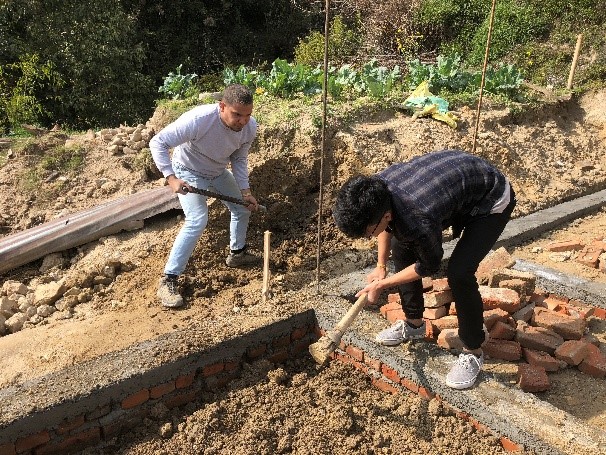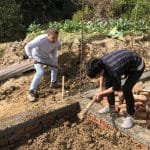
Reconstruction and Sustainability project helps with disaster recovery processes by making them more organised and long lasting. Due to its geographical location, Nepal is exceedingly susceptible to various forms of natural disasters, with a long history of earthquakes. Amongst the world’s twenty underprivileged countries, Nepal is now positioned as fourth in terms of climate change, 11th in terms of earthquake threat and 30th in terms of potential flood hazard.
The massive earthquake that occurred in Nepal on 25th April 2015 still has had significant impacts on the lives of people, especially those in marginalised communities. Noteworthy fractions of the affected residents are still living in very basic temporary housing with inadequate access to safe drinking water and sanitation services. People living in temporary shelters suffer every season; extreme heat in the summer, life-threatening cold in the winter and flooding in the monsoon. Destroyed office stations interfere with many front-line government services and the livelihood of millions of public have been jeopardised. Many people still have not fully recovered from the loss of life or assets and their lives are far from normal. Henceforth, the country and people still linger under a post-conflict transition that is yet to be addresses.
The project is designed with the concept of Building Back Better for the lives of disaster victims. The major goal is to provide a long-term and sustainable solution to bring back a normal state of affairs, along with increased livelihood opportunities. The activities continue until all systems return to normal or better. It measures, both short and long term, including the return of vital life-support systems to minimum operating standards; accessibility to public information; health and safety education; reconstruction. There are many opportunities during this period to enhance prevention and increase preparedness, response thus reducing vulnerability and finally leading to a sustainable development.
VIN seeks volunteers or interns with experience and knowledge in the field of disaster risk reduction. During your placement, you will live with a local Nepali host family, enabling you to become fully immersed in the language and culture around you. On the basis of your expertise, the Reconstruction and Sustainability volunteer/ intern will carry out one or more of the following activities:
- Conduct workshop on WASH (Water Sanitation & Hygiene) with children in community schools
- Rebuilding Earthquake Resistant Infrastructure (RERI)
- Promote environmentally sustainable reconstruction design to minimise future climate risks and strengthen ecosystem
- Support in building early childhood development centers, community schools, community centers or individual houses
- Actively conduct awareness and counseling programs targeting various section of population
- Reinforce the capability of people and societies to decrease their risk and vulnerability and to boost social cohesion
- Conduct interviews and surveys to document the impacts and consequences of natural disaster among various peoples
- Focus on the most vulnerable section of population and conduct capacity development sessions
- Facilitate earthquake Resistant Home Construction Education (REECH)
- Educate people at all the working sites on building disaster resistant homes, other infrastructures, preparedness and mitigation plan through implementing technical education program
- Conduct workshops on Entrepreneurship Development and life skills enhancement for youth and women groups
- Facilitate vocational training like plumbing, masonry, electrification, furniture making etc.
Project Specific Skills
- Background or experience in Reconstruction and Sustainability
- Proficient in conducting workshops and training
- Designing and construction skills
- Counselling skills
- Survey and Interviewing skills
- Experience in statistical analysis will be an added asset
Desirable/ Common Skills
- Excellent communicator with good interpersonal skills
- A team player with good workethics
- Time management and leadership qualities
- Adaptable, flexible and able to work under pressure
- Accepting of different ideas and culture
- Problem solving: always be part of solutions than part of a problem
- Creative
- Positive attitude
Requirements
- Gender: Female / Male
- Minimum Age: 18+ years (16-17 years old person can volunteer but need to present parents’/ guardian’s consent letter)
- Language:English (Intermediate)
- Educational:High School Graduate
Your Experience/ Setting
Upon your arrival at Kathmandu Tribhuvan International Airport (TIA), you will receive a warm welcome and be transported to your hotel or hostel. If you are already in Nepal before the start of your placement, we can make alternative arrangements for you. You will undergo a comprehensive two- to three-day induction program after arrival. This induction will provide valuable information about your project and general information about the Nepalese language, culture, health, safety, and security. It is also an excellent opportunity to connect with fellow volunteers and interns who can become your companions for sightseeing and a source of support throughout your volunteer placement.
During the induction period, you will be accommodated in a budget hotel or hostel arranged by VIN. However, most of the VIN experience involves living with a Nepalese host family. While this immersion is essential for a complete experience, we understand that it can be challenging as you adapt to a new culture and adjust to facilities that may be more basic than you are accustomed to. Don’t worry; all our host families have experience accommodating volunteers, although their English-speaking abilities may vary. Also, you will have 24-hour access to our staff members for support and assistance throughout your placement.
Volunteers will be assigned to one of VIN’s working areas, which include Tarakeshor Municipality in Kathmandu, Taluwa, Thulachhap, and Bhadaure in Okhaldhunga, and Okharpouwa and Kaule in the Nuwakot district. While at the working site, volunteers are requested to bring their lunch box, water bottle, safety gear, face mask, and any other essential belongings. We advise volunteers to dress comfortably and modestly, preferably with long sleeves. Please get in touch with us for guidance and support if you want to raise project funds or collect project-specific resources. This will help the community a lot.
Schedule and Commitment
You will work five to six days a week, up to six hours per day. You may propose your preferred time and hours; however, the working time period will be dependent on the institution you have been placed. A minimum of 2 weeks’ time commitment is expected of a volunteer. The longer you commit; the better impact you can make. You should be willing to commit a certain amount of your free time and energy, show a lot of commitment and be a good listener. You are expected to work constructively and co-operatively maintaining good reputation and standards at all times. Volunteer should abide by relevant security concerns and access procedures. Moreover, you should be receptive and positive to performance appraisal, advice and feedback. Throughout your placement, you will have the full support of VIN. Your safety is our highest priority.
Your typical day might look like this:
| 07:00-08:00 | Tea/Leisure Time |
| 08:00-09:00 | Breakfast/Brunch (Nepali meal – Daal-Bhaat) |
| 09:00-10:00 | Preparation for sessions |
| 10:00-13:00 | Conduct Research |
| 13:00-14:00 | Lunch (Packed lunch) |
| 15:00-17:00 | Deliver sessions to people on a cluster basis |
| 17:00-20:00 | Preparation for next day/Leisure time |
| 20:00-21:00 | Dinner (Nepali meal – Daal-Bhaat) |
You will receive a clear and concise on-the-job instructions, course of action, context of work and policies/strategies before your placement begins. You will be provided with ample of guidance and support throughout the placement with trainings / onboarding sessions incase necessary. You will be in a constant communication and regular check-in with the VIN volunteer coordinator. VIN aims to maintain a culture of continuous feedback between the volunteer supervisor at the placement to monitor the performance of the volunteer and ensure the project delivers desired outcomes.
In case of an emergency, you may contact one of our Volunteer Coordinators who will be available anytime for your assistance and support.
Click here to Learn more on how volunteering works
Mid and Long Term Volunteers:
2 weeks minimum stay- € 380
3 weeks – 480€
4 weeks – 580€ (after 4th week, for each additional week €95)
University Internships:
4 weeks minimum stay- € 680 (for each additional week – €105
Click here to Learn what’s included and excluded in our Fees Section
Click here to Learn recruitment process on how volunteering works
Our projects are open year-round, and our inductions begin on the first and third Mondays of each month. We would like to ask that volunteers arrive one day before the start of the induction. You can choose the duration of your participation based on your available time. However, so that you know, our volunteering placements are limited. We highly recommend booking your placement in advance to secure your placement. Click here to apply.



 Member of
Member of